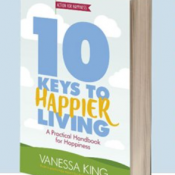Relating
Connect with people
Feeling connected to other people is at the heart of happiness - theirs and ours.
Whether these connections are with our partners, families, friends, work colleagues, neighbours or others in our communities, they can all contribute to happiness and resilience. So taking action to build, maintain and strengthen our relationships is important.
Having close relationships with family or friends provides love, meaning, support and can increase our feelings of self-worth. Our broader social networks, like those in our local community or at school or work, can contribute to a sense of belonging. Indeed studies show people with strong relationships are happier, healthier and may even live longer [1,2,3,4,5]. Having a network of social connections or high levels of social support even appears to increase our immunity to infection, lower our risk of heart disease and reduce mental decline as we get older [7].
There's lots we can do to build and maintain our relationships and feel more connected to our community.
Close relationships matter
Our close relationships generally matter most for our happiness. Whether these are with family or friends, studies show that having people that we trust, can rely on and which help us to feel valued, encouraged or loved positively boosts our wellbeing and resilience. As well as boosting how happy we feel, it can mean we are less prone to depression and other illnesses and it helps us recover more quickly [2,3,4,5].
Reflection: What helps you stay close to the people that matter most in your life?


Happiness and relationships – it works both ways!
Our relationships with others are of course two-way and it seems the connection between happiness and relationships is too. Not only do good relationships contribute to happiness, but also happy people tend to have more and better quality relationships [9]. Positive emotions and behaviours have also been shown to be catching, rippling out through our social networks - real and virtual [14]. So working on our relationships is good for happiness and working on our happiness is good for our relationships. That's a win all round!
Reflection: In what way does taking care of your wellbeing contribute to the quality of your connections with others?
Responsiveness
We feel close to others when we feel understood, valid and cared for. This helps us feel seen and accepted for who we are – our strengths and weaknesses, hopes, fears and needs, and that our views are listened to, even if they aren’t agreed with. Feeling cared for means we feel warmth or affection from others and that our wellbeing is cared about [15]. Others feel close to us when we do the same for them!
A great place to start is simply giving the other person our full attention and really listening. Focussing on them and what they are communicating, rather than having half an eye on our devices or thinking about what we think and want to say. When you’ve listened, perhaps even ask a few curious questions to show you are interested and to help you understand more about what’s going on for them.
Reflection: How can you remind yourself to really listen to others?


Loneliness, health and happiness
Whether you are naturally introverted or extroverted, for wellbeing we all need to feel connected to others [SDT]. Humans are a social species and our brain is hardwired for connection. Think about how good it feels to be loved and cared for, how reluctant we can be to break bonds with people, and how painful it is when we do, or if we feel ignored [10].
Feeling lonely is a signal that we need to seek and find connection. A bit like being thirsty is a signal to drink some water and it can be harmful if we don’t. If we feel lonely for prolonged periods of time it doesn’t just impact us psychologically, it can also be damaging to our physical health. If we feel lonely it can be hard to reach out, but it’s important we take action to feel more connected to others.
Reflection: What’s an action you could take to reach out and connect with others if you feel lonely?
Connect to your community
Although less deep than our close relationships, our connections in our communities are also important for happiness and wellbeing. This might include with people in our local neighbourhood, at work, school or through our interests or hobbies (like a local choir, sports team or gardening group. Having diverse social connections predicts how long we live and even impacts how resistant we are to catching colds! These broader social networks can provide a sense of belonging and influence how safe and secure we feel [13 + World Happiness Report].
Reflection: What is one small action you can take to help you be connected in your community?


Notice others’ strengths and what you share
It can be very easy to notice things that are different or we don’t like or are fearful about others, but we are all human beings and we all share the same core human needs – even if it doesn’t seem like it from the outside. And of course, everyone is a mix of strengths and weaker areas. Research shows that when we focus on the strengths of others, our interactions with them are likely to be more positive and constructive [10].
Reflection: For everyone you meet or interact with find something positive about them or find something that you have in common.
Every little action can count
Building connections in our local community not only contributes to our own happiness but to that of those around us, enabling our communities to flourish. The foundation of happier communities is the thousands of small behaviours and interactions that happen every day. So we can help to build happier communities by being conscious of the impact our behaviour has on those around us. It can be as simple as a friendly smile or saying hello to local people we recognise, offering a helping hand or checking in on an elderly neighbour.
Reflection: What is one small action you can take to contribute to happiness of others in your community?

References
[1] nef (2008) Five Ways to Wellbeing. Report prepared by the New Economics Foundation for the UK Government Foresight Project, Mental Capital and Wellbeing
[2] Ryan, R.M. & Deci, E.D. (2001) On happiness and human potentials: A review of research on hedonic and eudaimonic well-being. Annual Review of Psychology, 52, 141-66
[3] Seligman, M.E.P. (2011). Flourish: A visionary new understanding of happiness and well-being. New York: Free Press
[4] Ryff, C. (1989). Happiness is everything, or is it? Explorations on the meaning of psychological well-being. Journal of Personality and Social Psychology, 6. 1069-81.
[5] Huppert, F.A. (2008) Psychological wellbeing: Evidence regarding its causes and consequences. State of the Science Review: SR-X2, UK Government Foresight Project, Mental Capital and Wellbeing.
[6] Uchino, B.N., Cacioppo, J.T. & Kiecolt-Glaser,J.K. (1996) The Relationship Between Social Support and Physiological Processes: A Review With Emphasis on Underlying Mechanisms and Implications for Health. Psychological Bulletin Vol. 119, No. 3, 488-531
[7] Dickerson,S.S. & Zoccola, P.M. (2009) Towards a biology of social support. In S.J. Lopez & C.R. Snyder (Eds.) Oxford Handbook of Positive Psychology. NY: Oxford University Press.
[8] Maisel, N.C. & Gable, S.L. (2009) For richer…in good times…and in health: positive processes in relationships. In S.J. Lopez & C.R. Snyder (Eds.) Oxford Handbook of Positive Psychology. NY: Oxford University Press.
[9] Diener, E. & Biswas-Diener, R. (2008). Happiness: Unlocking the mysteries of psychological wealth. Oxford, UK: Blackwell
[10] Baumeister, R.F. & Leary, M.R. (1995). The Need to Belong: Desire for Interpersonal Attachments as a Fundamental Human Motivation. Psychological Bulletin, 117, 497-529
[11] Deci, E.D. (1995) Why We Do What We Do. NY: Penguin
[12] Valliant, G. (2008). Spiritual Evolution: How we are wired for faith, hope and love. NY: Broadway Books
[13] Bacon,N., Brophy, M., Nguni, N., Mulgan, G., & Shandro, A. (2010). The State Of Happiness: Can Public Policy Shape People's Wellbeing and Resilience? London: Young Foundation
[14] Fowler,J. & Christakis,N. (2009) Dynamic spread of happiness in a large social network: Longitudinal analysis over 20 years in the Framingham Heart Study. British Medical Journal, 338 pp. 1-13

Take the 10 Keys to Happier Living online coaching programme.





